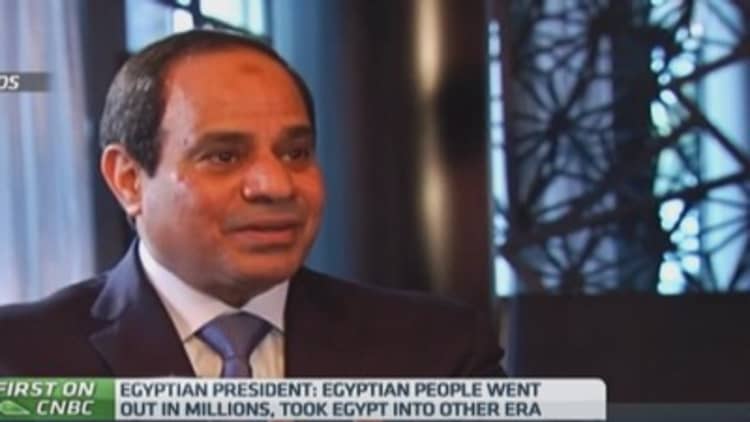
Historically seen as linchpin of U.S. strategy in the Middle East, Egypt has called on Washington and Brussels to realize the threats coming from the region and help the country to negate the spread of global terrorism.
With the Paris attacks still fresh in the mind, Secretary of State John Kerry is in London on Thursday, consulting with counter-terrorism coalition partners with the aim of degrading and defeating the Islamic State. Kerry will then arrive at the World Economic Forum in the Swiss resort of Davos with the same issue likely to be high on his agenda.
Meanwhile, awaiting his arrival, Egyptian President Abdel Fattah Al-Sisi, told CNBC Thursday that his message to the U.S. politician is that his country is critical in this struggle.
"We were the first to warn about the terror in the area over a year and half ago and the danger of the foreign fighters in Syria. It was us who told our European friends and of course the United States of America," he told CNBC on the outskirts of the event in Davos.
"We said that we are going to be facing danger from them, and to be alerted, and this is exactly what we have seen and what took place."
Sisi said that the country had received some of the biggest delegations of American business people in the past few years - as well as for Europe - and told all of them of his belief that investment would help further stabilize the country and thus the region.
"We told them that Egypt is not only a platform for investment but we agree that investment is to support stability in Egypt in the region and the world," he added.
The American who wants to save Egypt's bread
Egypt is the base of stability in the Middle East, according to Sisi – a viewpoint backed up by Kerry. In a trip to Cairo back in September Kerry said that Egypt had a critical role to play in publicly renouncing the ideology that Islamic State likes to spread.
Egypt, a country of 90 million, seems to be making progress after a tumultuous four years. In 2011, the country was plunged into economic and political mayhem during the Arab Spring uprising in the region which saw former Egyptian President Hosni Mubarak ousted from power.
Mubarak was replaced by Mohamed Morsi, a leading member of the now-banned Muslim Brotherhood organization, who was later removed by the Egyptian military in 2013 as more secular Egyptians complained increasingly about Morsi's perceived restrictive and religious policies.
Sisi, the former head of Egypt's armed forces, was an instrumental figure in the government that took over power after Morsi was ousted and in May 2014, was the winner of the presidential election.
-CNBC's Holly Ellyatt contributed to this report.







